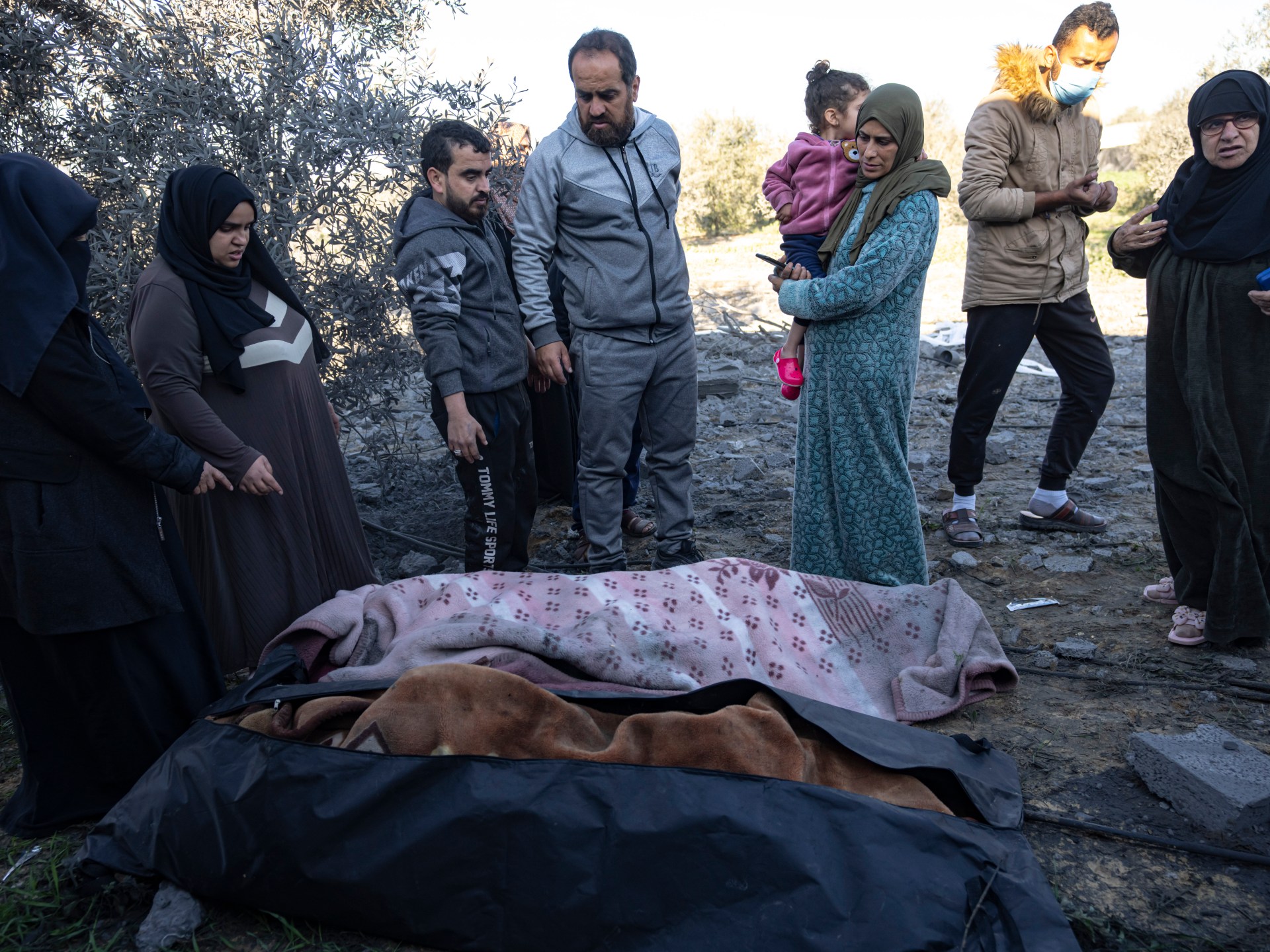Israel orders ‘death corridor’ evacuation for Palestinians in central Gaza | Israel-Palestine conflict
Central Gaza Strip — Israel has ordered Palestinians to evacuate from parts of central Gaza, its latest such directive as it pushes more of the besieged enclave’s 2.3 million-strong population into a smaller area while widening its bombardment of the Gaza Strip.
The Israeli military on Friday ordered families to flee for their “safety” to shelters in southern Gaza’s Deir el-Balah, from Bureij and areas of Nuseirat in central Gaza.
The announcement has incensed the region’s weary and exhausted residents, many of whom have already been internally displaced several times since October 7.
Scenes of mass displacement once again filled Salah al-Din Street that is linked to the entrance of the Bureij refugee camp.
Salah al-Din, a road stretching across the length of Gaza, has been dubbed the “death corridor” by many in the Strip. In previous evacuations, Palestinians fleeing parts of northern Gaza have been arrested, shot at and even killed – despite it being declared as a safe route by the Israeli army.
On Friday, hundreds of people carrying what is left of their personal belongings poured onto the street on foot. Others loaded pick-up trucks and donkey carts with mattresses, blankets, plastic chairs and whatever else they could grab.
Some could barely move after sustaining injuries from previous attacks, yet found themselves with no choice but to escape once again.
This was the case for Walaa al-Nuzeini, who was fleeing Bureij in a wheelchair and for the third time since the beginning of the assault.
Al-Nuzeini lived in the Shujayea neighbourhood of Gaza City when an Israeli air strike targeted her home on November 7.
“I lost my daughter, she died in my arms,” al-Nuzeini told Al Jazeera.
“We stayed under the rubble for three hours before they got us out,” she said, adding that the entire area is now “destroyed”.
Al-Nuzeini was badly hurt. She suffers from wounds in her leg, and said the nerve is affected which has been causing her “extreme pain”. She was taken to al-Shifa Hospital for treatment, but three days later Israeli soldiers raided the facility, Gaza’s largest hospital that is now no longer operating.
![[Abdelhakim Abu Riash/Al Jazeera]](https://www.aljazeera.com/wp-content/uploads/2023/12/1E3A2515-1703286306.jpg?w=770&resize=770%2C513)
“We left running out of fear and had to walk all the way to Nuseirat,” she recalled.
At the time, Israeli soldiers ordered doctors, patients and displaced people at the hospital to evacuate the medical compound, forcing some to leave at gunpoint, according to testimonies by doctors and Palestinian officials.
More than 7,000 people, including patients in a critical condition and newborn babies, were sheltering inside al-Shifa Hospital.
Humanitarian circumstances have become “very difficult”, al-Nuzeini said. She is now heading to Khan Younis, where her other children have set up a tent.
“This is not a life. We have no water, no food, no freedom of movement.”
‘We’re exhausted’
Two months ago, the Israeli military called on Palestinians in northern Gaza to flee to the south, but has continued to target and bomb civilians even there. Khan Younis is now a focus of Israeli attacks.
“There is no place that’s safe,” Salem al-Sheikh told Al Jazeera.
The elderly man said he was forcibly displaced from his home in Nassr neighbourhood in the west of Gaza City.
“They [the Israeli army] told us to leave, so I fled to al-Shifa Hospital, where I stayed for a month and a half. I then left to Nuseirat,” al-Sheikh said.
He was among the thousands who sought refuge in al-Shifa Hospital before it was attacked by Israeli forces.
![[Abdelhakim Abu Riash/Al Jazeera]](https://www.aljazeera.com/wp-content/uploads/2023/12/1E3A2528-1703286410.jpg?w=770&resize=770%2C513)
Now, for a third time, he is being displaced from Nuseirat.
The latest call for evacuation comes as Israeli ground troops continue to battle Palestinian fighters in southern and central Gaza.
In the last 48 hours alone, at least 390 people have been killed as the enclave plunged into digital darkness for the sixth time amid a communications blackout, Gaza’s health ministry said.
The United Nations says nearly 1.9 million people have now been displaced – more than 80 percent of the Gaza Strip’s pre-war population.
Many are crammed inside the Rafah governorate in southern Gaza, where al-Sheikh is heading.
The health ministry has warned that disease there is flourishing amid a lack of supplies, medicine, clean water and much-needed fuel.
Meanwhile, UN-run schools have largely become overcrowded shelters for thousands of displaced Palestinians.
“It’s been extremely difficult,” al-Sheikh said. “We walked from al-Shifa on foot … we passed Israeli army tanks until we made it to a school,” he said, referring to the second time he was displaced.
The schools, however, “are full,” he said. “There is no space.”
![[Abdelhakim Abu Riash/Al Jazeera]](https://www.aljazeera.com/wp-content/uploads/2023/12/5Q8B0124-1703286599.jpg?w=770&resize=770%2C513)
Many believe that the UN designation of these buildings will keep them safe from the constant Israeli bombardment.
However, several of the schools have been targeted or sustained damage from Israeli air raids in their vicinities. According to the UN agency for Palestinian refugees (UNRWA), some 1.4 million Palestinians are trapped in overcrowded and unprotected shelters run by the body that are now uninhabitable. The poor conditions in the makeshift accommodations have already led to an outbreak of scabies and smallpox, among other infections.
Al-Sheikh said he just wants to return home.
“We’re exhausted, moving from one place to the next. They need to let us get back to our homes.”
Some 60 percent of all residential units in the Strip have been damaged, or 254,000 homes. More than 20,000 Palestinians have been killed since the beginning of the latest offensive, including at least 8,000 children.
Rights groups have warned of the consequences of mass displacement, with organisations including Human Rights Watch labelling it a “war crime”.
Israeli Prime Minister Benjamin Netanyahu needs to “stop committing crimes and killing people’s children,” al-Sheikh said. “He needs to stop destroying homes on top of people’s heads.”
Check out our Latest News and Follow us at Facebook
Original Source







